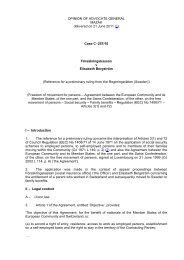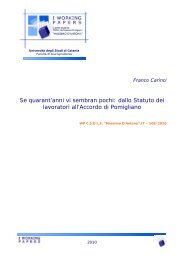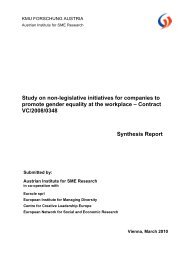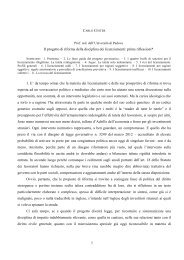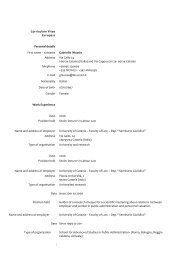Full text - European Trade Union Institute (ETUI)
Full text - European Trade Union Institute (ETUI)
Full text - European Trade Union Institute (ETUI)
Create successful ePaper yourself
Turn your PDF publications into a flip-book with our unique Google optimized e-Paper software.
Temporary agency work in the <strong>European</strong> <strong>Union</strong><br />
rules of the country of origin (or any other country) applicable to the employment<br />
contract. With the restrictive interpretation of the Posting of Workers<br />
Directive by the CJEU, compliance with the aim of the Directive becomes<br />
more difficult, in particular as regards the guarantee of fair competition and<br />
respect for workers’ rights (recital 9 of the Posting of Workers Directive),<br />
while safeguarding the fundamental social rights of collective bargaining and<br />
collective action.<br />
Are cross-border temporary agency workers also<br />
posted workers<br />
Article 1 of the Posting of Workers Directive, which defines the scope of the<br />
<strong>text</strong>, clearly states that it applies to ‘temporary employment undertaking[s]<br />
or placement agenc[ies], [which] hire out a worker to a user undertaking established<br />
or operating in the territory of a member state, provided there is an<br />
employment relationship between the temporary employment undertaking or<br />
placement agency and the worker during the period of posting’, also called<br />
cross-border temporary agency work. In concrete terms, a temporary agency<br />
worker who has been hired by a temporary work agency in country A is posted<br />
by the same agency to work in country B for a user undertaking.<br />
For its part, the Temporary Agency Work Directive does not explicitly exclude<br />
cross-border temporary agency work from its scope, as Article 1 states that<br />
‘this Directive applies to workers with a contract of employment or employment<br />
relationship with a temporary work agency who are assigned to user<br />
undertakings to work temporarily under their supervision and direction’. The<br />
<strong>European</strong> Commission explained in 2002 that: ‘The specific aim of this new<br />
legislation is to clarify and harmonise the conditions for posting workers at<br />
national level. It can be seen as an extension of arrangements already in force<br />
for transnational posting of temporary workers’ (2002/0072(COD)).<br />
However, according to the CJEU, transnational posting by a temporary work<br />
agency constitutes the provision of services and not normally an act of the<br />
free movement of workers. Grounds for this conclusion relate systematically<br />
to posted workers not as parts of the country of destination’s labour market.<br />
According to Schlachter (2012), however, ‘at least for temporary agency<br />
workers, this reasoning was never really adequate’. Even in the case of posted<br />
agency workers the CJEU has stated in the Vicoplus case (C-307 to C-309/09)<br />
that [posted agency workers] ‘gain access by means of making available of<br />
labour’. Consequently, and in particular in terms of labour law and protection<br />
of workers, it appears that for the minimum protection for transnational temporary<br />
agency workers (as well as for posted workers), some harmonisation of<br />
EU law and CJEU jurisprudence would be welcome.<br />
WP 2012.13 57





